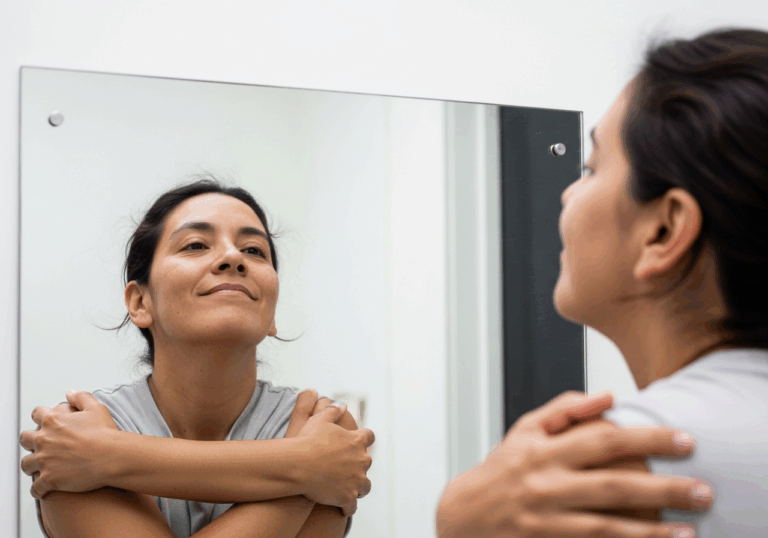Science-Backed Tips
Boost Your Emotional Wellbeing with Self-Compassion
Online self-compassion course reduces self-criticism by 30% in 2 months.
📊 Did you know?
💡 Why It Matters
1️⃣
Reducing self-criticism can enhance emotional balance, leading to improved mental health outcomes.
2️⃣
Increased self-reassurance supports resilience, potentially decreasing anxiety and depression rates.
3️⃣
Long-term benefits of self-compassion practices can contribute to overall life satisfaction.
✅ Try These Micro-Tips
🎯
Engage in 20-minute self-compassion exercises weekly to foster emotional resilience.
🎯
Practice daily affirmations focusing on self-kindness for at least 5 minutes.
🎯
Reflect on personal achievements and strengths every evening to boost self-reassurance.
🎯
Join an online self-compassion group for shared experiences and support.
📚 The study
This research highlights the importance of self-compassion practices in fostering emotional well-being. By reducing self-attack, individuals can achieve a greater sense of emotional balance, which is crucial for mental health. Moreover, the boost in self-reassurance not only supports resilience but also has the potential to lower anxiety and depression rates.
The long-term benefits of engaging in self-compassion exercises can lead to enhanced life satisfaction, making it a valuable tool for anyone looking to improve their emotional health. This study underscores that even brief moments of compassion towards oneself can yield lasting positive effects, paving the way for a more fulfilling and balanced life.
❓ Frequently Asked Questions ❓
Learn more
What is self-compassion?
Self-compassion involves treating oneself with kindness and understanding during difficult times. It contrasts with self-criticism, promoting emotional resilience and well-being.
How does self-compassion affect mental health?
Practicing self-compassion can significantly reduce self-criticism and enhance self-reassurance. This shift contributes to improved emotional balance and overall mental health outcomes.
What were the main findings of the online self-compassion course study?
The study found that a brief online self-compassion course reduced self-criticism and increased self-reassurance among participants. These effects were significant and maintained over a two-month follow-up period.
How long should I practice self-compassion exercises?
Engaging in self-compassion exercises for about 20 minutes weekly is recommended to foster emotional resilience. Consistent practice can lead to long-term benefits in emotional well-being.
Can self-compassion practices help with anxiety and depression?
Yes, increased self-reassurance from self-compassion practices can potentially decrease anxiety and depression rates. This supportive approach enhances resilience and emotional stability.
What are some daily self-compassion practices I can try?
Daily affirmations focusing on self-kindness for at least 5 minutes can be beneficial. Additionally, reflecting on personal achievements and strengths each evening can boost self-reassurance.
Is it necessary to join a group for self-compassion practice?
While not necessary, joining an online self-compassion group can provide shared experiences and support. This communal aspect can enhance motivation and deepen the practice.
What is the significance of the study’s medium effect size?
A medium effect size indicates a meaningful impact of the self-compassion intervention on reducing self-criticism and increasing self-reassurance. This suggests that even brief interventions can lead to substantial improvements in emotional well-being.
How can I measure my progress in self-compassion?
You can measure your progress by reflecting on changes in your self-talk and emotional responses over time. Keeping a journal to track your feelings and experiences related to self-compassion can also be helpful.
What should I do if I struggle with self-criticism?
If you struggle with self-criticism, consider starting with small self-compassion exercises to gradually shift your mindset. Seeking support from a therapist or joining a self-compassion group can also provide valuable guidance.





